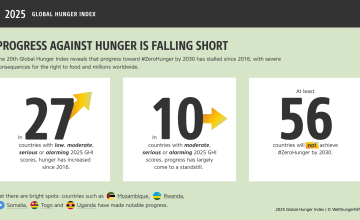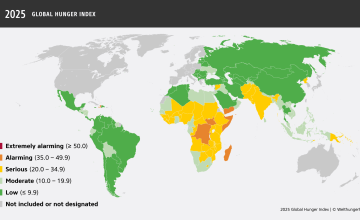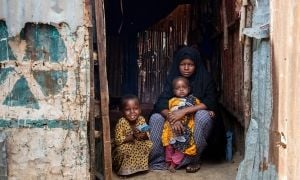
Read our 2024 annual report

Knowledge Hub
2025 Global Hunger Index
This is the twentieth annual publication of the Global Hunger Index (GHI), a report jointly published by Concern Worldwide and Welthungerhilfe.

The GHI tracks the state of hunger worldwide, by region, and by country, spotlighting those places where action to address hunger is most urgently needed.
Tragically, after decades of slow but steady progress against food and nutrition insecurity, the trajectory has shifted. The 2025 global GHI score has improved only slightly compared with the 2016 score—meaning that nearly a decade of calls to action have produced meager results.
Given that progress on ending hunger has stagnated since 2016, the aspiration of achieving Zero Hunger by 2030—Sustainable Development Goal 2, which the community of nations adopted unanimously in 2015—now seems out of reach.


Although the global GHI score declined slightly from 19.0 to 18.3 between 2016 and 2025, the underlying trends remain deeply concerning.
Conflict remains the most destructive force driving hunger. Armed violence fueled 20 food crises affecting nearly 140 million people in the past year.Humanitarian assistance budgets have dropped sharply, while military spending has surged—an inversion of priorities that undermines the global hunger response.
Examples from countries such as Angola, Bangladesh, Ethiopia, India, Nepal, and Sierra Leone show that targeted policies and sustained investments can drive meaningful progress in reducing hunger. However, these gains remain fragile, highlighting the need for sound policies that promote sustained support, early-warning systems, climate resilience, and food systems transformation to protect and build on success.




